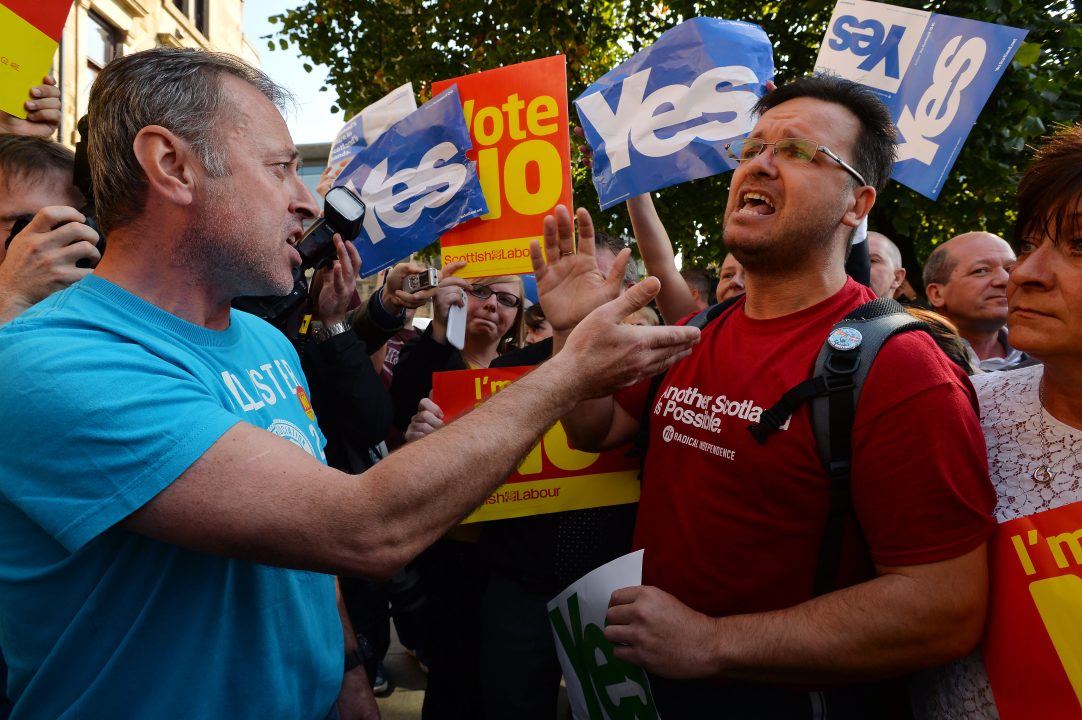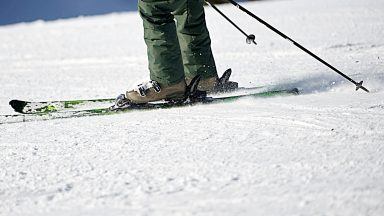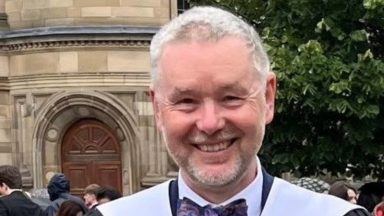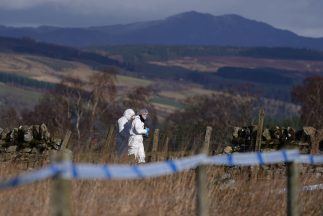2014 was an incredible time to be a journalist in Scotland.
The referendum campaign rolled right off the back of the successful Commonwealth Games in Glasgow and a surprisingly sunny summer.
I also remember quite a few sunny days on the campaign trail. People were more engaged with the political process than I have ever seen in Scotland. It felt like everyone either had a view or was trying to work out their view.
I had covered a fair few elections by then, even the devolution referendum of 1997, but none of them were on this scale. None of them felt as big.
One of the biggest events of the entire campaign was the STV debate between then First Minister Alex Salmond, who was leading the Yes campaign, and former chancellor Alastair Darling, who was leading the No campaign.
Just two days after the end of the Commonwealth Games, STV took over the Royal Conservatoire of Scotland, and on August 5 turned the news spotlight from sport to Scottish politics.
This was much anticipated as the biggest clash of entire referendum. There were high expectations. Many expected Alex Salmond to win as a highly accomplished debater, which left Alastair Darling as the underdog, which probably suited him.
Bernard Ponsonby chaired “Salmond and Darling: The Debate” in front of a live (and lively) audience of 350 people. Two hours of peak time TV, pulling in an audience of more than 900,000 all over Scotland. It was huge.
The most memorable bit of the debate was when Darling questioned Salmond on currency, suggesting that Salmond’s plan to keep the pound in a currency union with England after independence was “a bit like having a divorce and keeping the same bank account – what’s Plan B?”
Salmond stuck to his line of keeping the pound, leading to Darling’s strongest line: “In the event of independence I assume our flag is the Saltire, our capital is Edinburgh. What is our currency?”
That was the exchange that sticks in my mind as winning the debate for Alastair Darling. I didn’t work for STV at the time, but I was there for post-debate punditry with John MacKay
At the time it felt like Darling was the winner over Salmond by a narrow margin; although with the distance of a decade, the margin feels a bit wider. Maybe that’s because currency became one of the key questions of the whole campaign.
It was something the pro-UK campaign hammered and something the pro-independence campaign struggled with, and is still struggling with ten years on.
This felt like the start of the referendum campaign proper, but this wasn’t just a debate for the telly. There were hundreds of debates in halls up and down the country – more in homes, pubs, workplaces – in fact anywhere people met, there were debates.
There were meetings and rallies on both sides. Politicians took to the streets to engage with voters. I remember being on the back of Jim Sillars’ snappy bus going around Glasgow housing schemes as he shouted the benefits of independence, when one man in his underpants came out of his house to yell back “shut the f*** up, I’m just off the night shift”.
I remember seeing Jim Murphy delivering his stump speech in the street from atop his Irn Bru crate, with Annabel Goldie his most ardent supporter.
I still remember my surprise at seeing a former Labour cabinet minister and a former Scottish Conservative leader working so closely, for the first time in the real world. For them it really was Better Together.
Another event that really sticks in my mind from much earlier in the whole process was a debate I chaired at Edinburgh Napier University in 2013.
Another former Scottish Conservative leader, David McLetchie, was on the panel. He had just returned to campaigning after brain surgery for cancer.
David McLetchie was another excellent debater, quick and witty in parliament. But his operation and treatment slowed him down a bit. Beforehand, I told him I would not come to him first for responses, to give him a little bit more thinking time since there were three panellists on either side.
Both sides were happy with that plan, until it came to the final audience question of the night when David couldn’t stop himself answering first.
The question was “what will you do if you don’t win the referendum?” As quick as a flash the Conservative politician said: “I don’t want independence, but if that is what people vote for, then I will be trying to get the best deal I can for Scotland in the independence negotiations.”
David died later that year and that conciliatory tone was sadly lacking from the latter stages of the campaign.
There were political threats and actual threats when feelings boiled over on both sides, but what I mostly remember is the incredible level of political engagement and the high quality of debate over Scotland’s future.
At the time, it felt like the biggest and most exciting news story I was ever likely to cover – the people choosing the future of their country, my country, and it still feels that big. Looking back, it really was exciting, but I understand that for many people it still feels raw, and reading reflections like this will be difficult.
The vote on September 18, 2014 was clear. I remember saying on the STV results programme that the first result of the night, from my home area Clackmannanshire, would probably reflect the result of the rest of the country.
In the Wee County, people had voted 46.2% Yes and 53.8% No. In response to the question on the ballot paper “Should Scotland be an independent country?” Scotland had said No by 55.3% to 44.7%.
Is that an end to Scotland’s constitutional debate? Absolutely not. It has dominated Scottish politics for the last decade.
This year’s general election suggests it is no longer the biggest driving force of political debate in Scotland, but it hasn’t gone away.
Salmond described the referendum as a “once in a generation” opportunity. That has been cast up by opponents of another referendum ever since, demanding that supporters of IndyRef2 stick to what was said in 2014 and respect the vote of the Scottish people.
In another ten years it will pretty much be a generation on from 2014, maybe we could consider it a de-facto generation.
Who knows where Scottish politics will be then?
Follow STV News on WhatsApp
Scan the QR code on your mobile device for all the latest news from around the country


 Mark Runnacles / Stringer via Getty Images
Mark Runnacles / Stringer via Getty Images
























